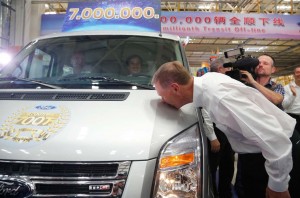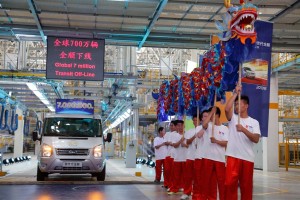With rare exception, what happens in China stays in China – at least when it comes to the booming Asian nation’s automotive market. Domestic demand has been more than strong enough, so far, to absorb production and still leave manufacturers racing to add more capacity.
But the situation may soon change. While a number of makers have been considering export opportunities, Ford appears to have that clearly in mind as it prepares to significantly expand production under a variety of different Chinese joint ventures.
“I think it’s just a matter of time,” Ford President and Chief Executive Officer Alan Mulally today said during an interview on Bloomberg TV. “Over time, all of our facilities are positioned so we can support all the markets around the world from any location.”
After a late state that has left it lagging key rivals like Volkswagen AG and General Motors Corp., Ford is racing to add new capacity in the world’s largest automotive market. Exporting from China could give the maker an opportunity to keep its new plants running if it can’t gain more of a foothold in China.

Ford CEO Alan Mulally plants a kiss on the Transit during a visit to China to announce new ventures.
But there are signs that Ford is finally gaining momentum. Its sales have surged 48% since the beginning of the year, making it the fastest-growing major foreign maker in China. And Ford has set a target of hitting 6% market share by 2015 – which would likely still leave it well behind market leaders Volkswagen and General Motors.
(GM has big expansion plans for China. For the story, Click Here.)
Underscoring the importance of its Chinese expansion plans, CEO Mulally was on hand at the opening of the JMC Xiaolan Plant, a new commercial vehicle assembly plant in Nanchang, Jiangxi province. At an event marked by the production of the seven millionth Ford Transit by the Ford-JMC joint venture, the partners also announced plans for a brand new engine plant and two all-new Ford products.
Ford has been racing to catch up over the last several years, but the maker isn’t getting a free ride, a wide range of competitors, including GM, VW and Chinese-owned Volvo have all announced expansion plans in China recently. That has raised growing concerns about Ford’s prospects in what is now the world’s largest automotive market – one factor in the recent decision by S&P to downgrade Ford stock from “Buy” to “Hold.”
(For more on Volvo’s Chinese fire drill, Click Here.)
Ford CEO Mulally’s repeated trips to China clearly underscore the concerns the maker has – and its determination to pull out all stops.
“Jiangling has been a great partner for Ford in China and we are excited about the expansion of our partnership,” said Mulally. “We have a long-term commitment to this partnership and have plans in place to further increase capacity, bring in great new products, and introduce Ford’s leading global technologies.”
Ford also has announced a new $500 million engine plant in Chongqing as part of its joint venture with Changan Ford Automobile. With an initial capacity of 400,000 units, the new Changan Ford Engine Plant (CAFEP) more than doubles current engine production capacity of 350,000 units, helping to meet rapidly growing demand for the joint venture’s vehicles in China.
As one of Ford’s largest and most advanced engine plants in the world, it employs technologies to minimize environmental impact by reducing water, chemical and electricity usage, and significantly cutting carbon dioxide emissions.
“This new engine plant is world class,” Mulally said. “The engines produced here and the process by which they are manufactured represent the latest in sustainable and green manufacturing processes.” Ford will initially manufacture two engines at CAFEP: a 1.5-liter naturally aspirated four-cylinder, and Ford’s 1.0-liter three-cylider EcoBoost engine, recently named International Engine of the Year for the second year running. Producing engines for vehicles including the Ford EcoSport and Fiesta, CAFEP will help to support Ford’s plan to introduce 15 new vehicles in China by 2015.
“This kind of expansion is nearly unprecedented, and it really reflects the level of commitment we have to this region,” said Mulally. “CAFEP and the other plants we’re building in Asia Pacific represent long-term investments over decades.”
Meanwhile, the new Xiaolan Plant more than doubles JMC’s annual vehicle production capacity to 545,000 units from 245,000 units. The plant represents a $300 million investment by Ford’s strategic partner Jiangling Motors Corp (JMC) and produces both Ford- and JMC-branded vehicles on a highly flexible production line. The first vehicle to come off the production line at the plant was the seven millionth Ford Transit ever produced.
In addition to launching its JMC Xiaolan Plant, Ford and JMC also announced plans for a brand new engine plant in its Xiaolan manufacturing base. The new engine plant will have initial annual capacity of 200,000 units.
As part of its expansion of the JMC partnership, Ford will bring two new global products to JMC: an all-new Ford commercial vehicle as well as an all-new Ford SUV. When launched, Ford will have a full portfolio of vehicles in the heavy duty truck, light commercial, and SUV segments in China.
Mulally said the announcement was part of a series of recent moves that demonstrate the growing success of Ford’s 17-year partnership with JMC. In April 2013, Ford announced an increased stake in JMC—from 30 percent to 31.5 percent. In August 2012, JMC moved to acquire Taiyuan Heavy Truck, giving Ford a major foothold in the heavy duty truck segment in China.
(Paul A. Eisenstein contributed to this report.)


Question is where will they export to Asia,
the Pacific,Australia,India ,East Europe ?
from a purely business standpoint Mulally seems to be moving in the right directions.
Forgot to add Mulally ,GM and others are probably liking China labor no Aerospace and Machinists,Teamsters or
United Autoworker unions ,no or minimal pension or health and welfare costs .
Just Like the US autoworkers prior to the 1950’s .
Yup more U.S. jobs will be lost as a result of the expansion of GM and Ford design, engineering and production in China. Just as the big box companies like K-Mart, Walmart, Home Depot and others have done, the majority of products sold in the U.S. will be (poorly) produced Chinese crap sold to gullible people in the U.S. too dumb to stand up and say NO we ain’t buying this crap from China. Like sheep, people in the U.S. are being led to the slaughter house… According to the think tanks and experts in DC – the new U.S. economic model is HIGH unemployment from now on. Think about the ramifications of that economic policy and the executives who receive many millions of dollars in annual compensation by using Chinese slave labor and exporting U.S. jobs. It’s a disgrace. Perhaps these execs should move to China to live instead of enjoying the U.S. lifestyle paid for by U.S. consumers?